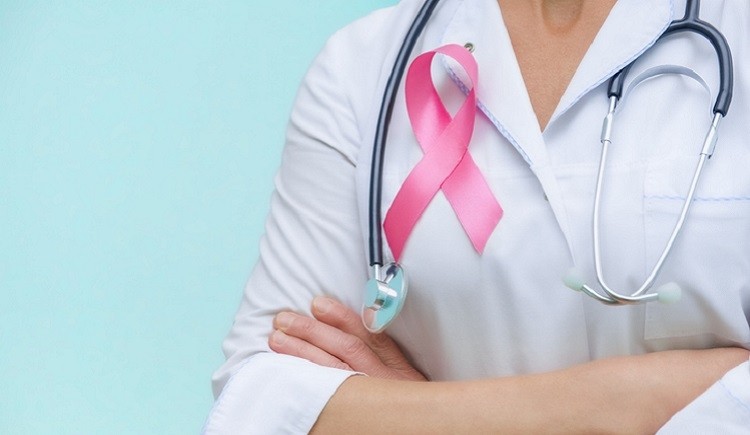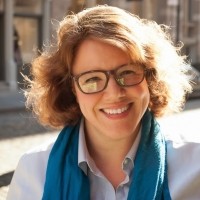Trial matching platform connects cancer patient to answers

When Alin Wagner-Lahmy received her breast cancer diagnosis last year, it essentially put her busy, full life on pause. The New York City-based digital marketing specialist and mother of two tween kids suddenly had to make room for doctor visits, tests, treatment, lifestyle shifts and a lot of uncertainty.
Eventually, Wagner-Lahmy connected with TrialJectory, a digital health specialist that harnesses artificial intelligence (AI) and other advanced tools to give cancer patients broader options and information in their treatment path. The company and cofounder/CEO Tzvia Bader provided clarity about Wagner-Lahmy’s diagnosis, and helpful tools like its COVID-19 Self-Checker and Monitoring App.
Outsourcing-Pharma (OSP) recently discussed life as a patient with Wagner-Lahmy (AWL), and how TrialJectory impacted her experience.
OSP: Please tell me a bit about your life right before, and then right after your diagnosis.
AWL: I was diagnosed with Breast Cancer in February 2019. Life before was like any average mom on the east coast: busy with family, work, kids; I was in good health overall.
Once diagnosed, I had to stop life completely and focus on removal of the tumor, and healing process. Life after the discovery of breast cancer meant more routine checks, being more careful with what I eat and drink to try to maintain a healthier lifestyle, yet not giving up the small joys of life. I am more thankful for every moment that passes - happy or sad, difficult or joyful. I am thankful I am here to experience whatever is there to experience.
OSP: What were some of the big (and little—whatever you’d like to talk about is great) concerns that went through your mind after your diagnosis?
AWL: Understanding and digesting the fact that I have cancer meant understanding how fragile life is. When conversations with doctors - regardless of cancer stage and type - are in the language of “survival rates” for five, 10, 15 years, it shows you how fragile life is and how much you should really make the most of it.
OSP: What was your experience receiving care and advice from doctors and other folks in the medical community after your diagnosis? Did you feel well cared for/attended to, a little lost, maybe a mix of the two?
AWL: I was very lost. Scared. I was overwhelmed with the news and needed someone to explain to me what I have, and what’s the suggested treatment that will target the specific cancer I had.
Instead, I was treated as part of everyone else diagnosed with any type of cancer - take the red pill and good luck to you. It feels a little like a “factory process” where one is diagnosed and there’s a generic treatment given - one that may or may not work - not allowing any room to explore other possible solutions.
It feels very much out of control - the tests, the biopsies, the scans, the treatment - it’s all dictated to the patient with no explanation and dialogue, and “good luck to you”. Protocol, as doctors describe it, is a generic treatment that just shoots everywhere, and if it’s successful - great, and if not - too bad. You are sent on your way to get protocol treatment.
OSP: What kind of experience have you had with clinical trials? Also, was that an option you brought up, that one of your docs/caregivers mentioned, or did you uncover that on your own?
AWL: I had zero experience with clinical trials. I was looking for them for my mom 10 years ago when she was diagnosed with cervical cancer and it was extremely hard to find as well as understand how to find the right trial - finding the specific trials relevant to my mom, the language and complex medical jargon, the matching criteria, etc. No one mentioned any clinical trial options to me, but I had it in the back of my head as an option.
OSP: How did you come to know TrialJectory?
AWL: I know Tzvia as we are in the same social circle. I met Tzvia at a social event and shared the news of my diagnosis. I expressed my concerns with the “factory process” I was going through, with no actual matching of the treatment to me and my specific condition, “here’s protocol treatment and good luck!” I told her I felt like I was given an Advil, with a 50/50 chance of getting better. A little like roulette.
Immediately, Tzvia connected me with one of the TrialJectory team who was able to guide me through the advanced treatment path.
OSP: How has TrialJectory helped you on your journey?
AWL: Options, understanding of what I have and how it can be treated. No more “Advil” and generic solutions. I felt the treatment offered was specific to the type of cancer I have and not a blanket solution with an obscure success rate. I got a list of available treatments, specific to the cancer I have, and not a generic treatment that may or may not help.
OSP: Specifically, could you tell us about your experience with the COVID-19 app? How has that benefited you?
AWL: COVID-19 has brought much havoc into everyone’s life, but it was even scarier for me as I know my immune system is weaker than everyone else’s seeing I just finished treatment when COVID started. The TrialJectory app gave me double confirmation: first is the ability to check for COVID daily, the other is the availability of a nurse to help on the go in case there are fears of COVID.
OSP: Would you be willing to please tell us where you are now in your cancer journey?
AWL: I have finished all treatments and am now in the routine check up and follow up process.
OSP: What advice would you give to newly diagnosed cancer patients about clinical trials, and matching technology like TrialJectory?
AWL: Clinical trials are your first lifeline!! Don't waste time trying the “generic” treatment, waiting for it to fail, to try a specific treatment that is designed for your specific cancer. Time is of essence and you should choose the right treatment for you.
OSP: Do you have any advice or requests from professionals on the clinical trial side of things? How can they better engage and consider the needs of cancer patients?
AWL: Protocol isn’t working anymore for all cancers. Clinical trials and advanced treatments are saving the lives of patients that would have died.


















